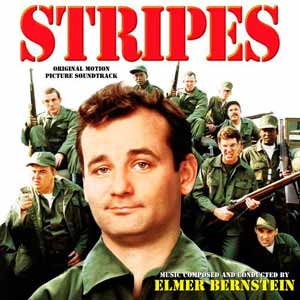Stripes!
Music and conducted by Elmer Bernstein
Performed by the The Hollywood Studio Symphony
Available on Varese Sarabande (302 066 663 2)
Running Time: 39:11
Amazon US

See also:
The Essential Elmer Bernstein Film Music Collection The Great Escape Elmer Bernstein had been typecast in such genres as the great westerns and biblical epics, and his move to scoring comedy was a coincidence thanks to the persistence of producer John Landis, whose best friend turned out to be Bernstein’s son, Peter. The film they made was the frat house comedy Animal Farm, whose smashing success caused an unlikely rejuvenation in Bernstein’s career. Stripes marked the third installment in a trilogy of genre comedy films by director Ivan Reitman, who with films such as Airplane, Meatballs and later Ghostbusters would bring a revival to the genre, and to Bernstein’s flagging career.
The premise of Stripes is simple. Bill Murray plays a low life taxi cab driver who tries to turn his life around by enlisting in the army. Naturally the life of the armed forces turns out to be more than he had bargained for with oddball characters played by Harold Ramis and John Candy. The army is never the same following their misadventures.
Elmer Bernstein's score for Stripes is a classic. Bernstein’s most memorable cue for Stripes is the energetic martial theme, almost an homage to The Great Escape. Make no mistake about it, the march is in every bit as memorable as the one he wrote for The Great Escape. The thing that makes this comedy score work is that the composer treats the material with great sincerity and straight forwardness and therefore what results is a tremendously exciting action score with a nod of parody towards the seriously intended The Great Escape. Not that there aren’t moments of sincerity either. In the film’s smaller moments, the composer uses a minor key piano rag to deftly color the bittersweet humanity beneath Bill Murray’s sarcastic loser character John Ringer. Both these martial theme and piano rag alternate and play each other off throughout the score without overstaying their welcome.
The album highlights are in tracks like ‘Haircut’ and ‘Training’, which build upon the march with great gusto and hilarity. Meanwhile, ominous suspense bars provoke snickers in ‘Rescued’, while ‘V-J-R’ adds relief as the tension eases and a triumphant crescendo peaks with the title march. Another spin-off march called ‘Graduation March’ works well as a recurring gag in the film and on album.
There is even an interesting homage to Miklos Rozsa sailor song: ‘Abu’s Song’ from The Thief of Baghdad that is used as a melancholy gag in ‘Gone’. Rounding the disc is a special bonus: ‘Stripes Trailer’ cue composed by the composer.
The album artwork coincides with the DVD release, and the production values are good. The release features very informative and interesting liner notes by Jerry McCulley. Sound recording is all right, but Dan Wallin’s engineered sound field is too narrow for my taste. Thankfully the Varese Sarabande’s release of the album is a boon to fans for whom this has been a Holy Grail for over twenty years. It’s not an album that necessarily has a hugely emotional impact on the listener, but the themes are so catchy you can’t get them out of your head. (Meaning you might not be able to wipe off that silly grin on your face.)
Amer Zahid
Rating:
3.5
Return to Reviews Index